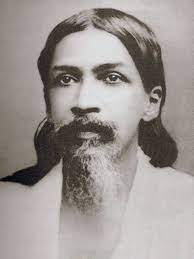Sri Aurobindo:

PM Modi has announced that 150 universities across the country will be involved in writing papers on different aspects of spiritual leader Sri Aurobindo’s life and philosophy to commemorate his 150th birth anniversary.
- Sri Aurobindo was born on August 15, 1872, in Kolkata, West Bengal.
- He was a yogi, seer, philosopher, poet, and Indian nationalist who propounded a philosophy of divine life on earth through spiritual evolution.
- From 1902 to 1910 he partook in the struggle to free India from the British.
- In Pondichéry he founded a community of spiritual seekers, which took shape as the Sri Aurobindo Ashram in 1926.
- He was much influenced by the American Revolution, revolts in Italy and the medieval French revolts against England.
- He attended Congress sessions and at the same time, helped establish the Anushilan Samiti of Calcutta in 1902.
- He and his brother revolutionary Barin Ghose contributed articles to the magazine Jugantar which inspired many young people to take up revolutionary work.
- He was also a journalist, editing newspapers such as Bande Mataram.
- In May 1908, Aurobindo was arrested in connection with the Alipore Conspiracy Case.
- In 1914, he started publishing a magazine Arya.
- He wrote copiously and his greatest literary achievement was ‘Savitri’, an epic poem with about 24000 lines.
- He developed a kind of Yoga called Integral Yoga.
- Sri Aurobindo Ghosh was considered as a prophet of Indian nationalism. Along with Bankimchandra, Tilak and Dayanand, he developed the theory of nationalism in India.
- Sri Aurobindo’s theory of nationalism was based on Vedanta philosophy which saw unity and oneness in man and God.
- He declared that India was in fact Mother India which represented the united power and Shakti of millions of her children.
- Mother India represented the infinite energy of her people: He identified Mother India with God and maintained that it was God’s divine mission to set India free.
- He said that the village should retain its autonomy and self-government but at the same time, ‘should seek to promote national cohesion.
- The ideal of national Swaraj must be modeled on the old village community which was self-sufficient, autonomous and self-governing.




